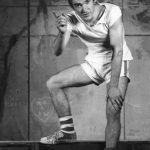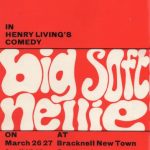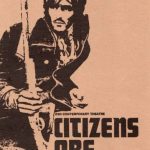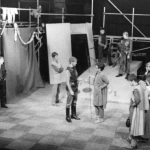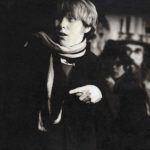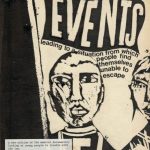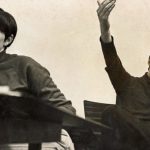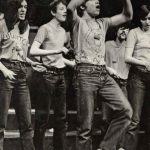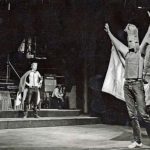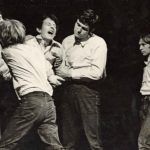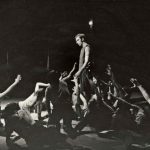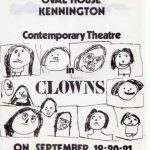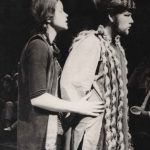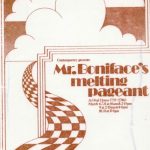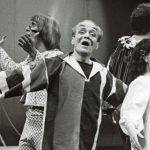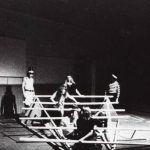Company Name: Contemporary Theatre (previously 1520 Theatre and 1520 Contemporary Theatre)
Founder: Bill Martin
Established: In 1963 Bill Martin founded 1520 Theatre (the name indicating the age range of the group) as a touring company with a core of ex-students from Chace Boys’ School, Enfield. When they moved their base to Oval House, from about 1967, they renamed the company, Contemporary Theatre.
Reason: From 1960 Martin was teaching at Chace Boys’ School, Enfield and staged ambitious school productions that would work with all male casts such as Billy Budd, Emil and the Detectives and an original adaptation of William Golding’s Lord of the Flies. Martin had successfully applied for an innovative scheme set up by the Royal Court Theatre in 1961 whereby his students spent a week at the Royal Court looking at all aspects of the theatre’s work and there was an ongoing programme of visits. This culminated in a performance Square, Round or Dead? at Theatre Royal, Stratford East in 1963. As Martin’s student performers left school, he set up a youth theatre group – 1520 Theatre to enable their work to continue.
Current Status: The last recorded performance by Contemporary Theatre is A Small Hero – at Northcott Theatre, Exeter in June 1975.
Area of Work: Youth Theatre, Theatre-in-Education and Political Theatre.
Policy: In 1972 Bill Martin explained the company’s two aims: ‘One was to forge a company working within a style on a repertory of plays which had relevance to a wide social spectrum, outside the institutionalized theatre….The other was a series of drama activities involving people in the community using relevant material. It seemed to be (although I’m never sure why) a form of “educational drama”.’ (Theatre Quarterly). He also saw the work as ‘… a means of helping young people to come to terms with themselves through drama’. (Sunday Telegraph, 1969).
Structure: The company was led by Bill Martin, who described his role as being ‘a sort of chairman’. He directed all productions and wrote the scripts around improvisation workshops.
Based: London based.
Funding: Initially all the actors were unpaid non-professionals and the company were running up debts even before financially disastrous runs at the Theatre Royal Stratford East and the Roundhouse. Lack of funding was very much an obstacle to the company’s development and Martin credits the policy of Peter Oliver at Oval House of allowing up-coming companies to have free access to devising and rehearsal space as essential in the development of productions such as Events…. Later work based at The Cockpit was more obviously aimed at school audiences, such as The Greatest Nursery Rhyme of Our Time, and received support from Greater London Arts Association.
Performance venues: Theatre Royal Stratford East, Oval House, Southgate Technical College, The Roundhouse, Holland Park School, Arts Lab Drury Lane, The Cockpit, Bracknell. Bury St, Edmonds, Banbury Technical College, Bristol University, Felixstowe, Northcott Theatre Exeter,
Audiences: ‘If you are a youth club or centre or an old people’s home or educational institution in the London area and are prepared to countenance unorthodox methods they would be an exciting and worthwhile troupe to ask along’ (Time Out October,1970)
Gallery:
Company work and process:
1520 Theatre The culmination of Martin’s work at Chace Boys’ School was a presentation Square, Round or Dead? at the Theatre Royal Stratford East. Dramatic extracts were presented in the context of a theatrical discussion on the relevance of theatre to young people’s lives in 1963. The idea of creating theatre that would speak directly to young people, outside of the context of what was seen as a stagnant orthodox theatre, would drive all of Martin’s work. As the core of his students were now leaving the school, Martin formed a touring youth theatre company, 1520 Theatre, to enable them to continue the drama work that they had been doing. This group included Bob Spiers (who would go on to be a successful director of comedy at the BBC), Brian Tree and John Brownlee all of whom would work with Martin over the next five years. Martin utilised the contacts made at the Theatre Royal Stratford – Clive Barker became the group’s president and Shelagh Delaney, its patron. In December the new company returned to the Theatre Royal with Woyzeck accompanied by a short film made by Martin and his students. Martin left the Enfield school in 1964 and Southgate Technical College, where Bob Spiers was attending, became a regular venue. Jill Coningsby – the sister of two other Enfield regulars – joined the company for touring productions of The Ragman’s Daughter and in 1966, Henry Livings’ Big Soft Nellie.
Alan Sillitoe and Theatre Royal Stratford Martin had been in communication with Alan Sillitoe since he had adapted The Loneliness of The Long Distance Runner for the initial Stratford presentation – the theme of a borstal boy being unprepared to buckle down to authority seems to have particularly resonated with Martin’s teaching experiences. With Sillitoe’s agreement the company adapted two further Sillitoe stories as The Ragman’s Daughter and a double-bill of this and The Loneliness of The Long Distance Runner was toured in 1966 under the modified company name, 1520 Contemporary Theatre. Martin integrated projected film footage to provide links in this double-bill. In 1967 a more ambitious Sillitoe project was taken on – All Citizens Are Soldiers – an adaption by Alan Sillitoe and Ruth Fainlight of Lope de Vegas’ Fuente Ovejuna set in a Madrid theatre in 1936. The play ran for a week in the main house and with a cast of 19 and a large multileveled set designed by Martin, The Stage described it as ‘one of the most courageous and astonishing ventures I have ever seen attempted by an amateur company.’ However with no direct financial subsidy, Martin found that ‘Working in a theatrical setting, we lost money’.
Peter Oliver and Oval House In 1967 Martin had a chance meeting with Peter Oliver. Oval House was primarily a youth club at this time and Oliver was starting to build up the theatre work. Changing the company’s name to Contemporary Theatre they moved their base to Oval House and ‘ …. expanded to absorb many Oval habitués – from the thriving drama scene that existed there already. Bill did his best work in this sort of setting, half-social work; half paid performances.’ (Time Out). Martin ran improvisational sessions ‘free-for-alls which many found liberating and enjoyable … at the root of our work was a concept of play’. The company also toured Halliwell’s Little Malcolm and His Struggle Against the Eunuchs around London youth clubs. Oliver was bringing in visiting theatre groups to the Oval from the emerging alternative scene and this was to influence the direction of the company’s work. Peter Schumann’s Bread and Puppet Theatre first visit to London in the Spring 1968 was described by Martin as ‘ a landmark…. incorporating an uncompromising vision with an attitude to games, songs, dance, history, story-telling and community…. The surprise and delight of Schumann’s theatre considerably broadened the experience and confidence of the group we were working with.’ (Martin,1972)
Documentary Theatre Martin was contacted by Michael Power of the Medical Research Council with the aim of using some of his actors to illustrate the theme of the difficulty of communication in a juvenile court at the International Mental Health Congress to be held in London, August 1968. Martin involved the company in extensive research – visiting courts, talking to magistrates and probation officers, visiting approved schools and borstals and although there had initially been no intention of making ‘a play’, ultimately the idea of a lecture was abandoned: ‘Acting out the situations seemed a much better way of demonstrating them than just talking about them’. Whilst they liaised closely with Power and his colleague to ensure authenticity, the company brought their newly evolving alternative theatre sensibility to the material and the development of the performance utilised improvisations and ritual, slides and song. The enthusiastic response of the audience of ‘grim-faced experts’ was encouraging. Around this time Martin, and co-author Gordon Vallins, published Exploration Drama – aimed at drama teachers and linked to a series of student books: Routes, Carnival, Horizon and Legend.
Events leading to a situation…. With a wealth of research material from the MRC project still not explored and a freedom to ‘go their own way’ a second version was worked on. ‘We wanted to expand our work to include more music and dancing’. The resulting musical documentary, Events leading to a situation from which people find themselves unable to escape had been broadened to more generally investigate young people in trouble with the law and was presented at Oval House with tape recorded dialogue, slides and film as well as live music and performance in late 1968. It was the company’s most innovative and critically successful production and a more ambitious transfer was now planned ‘… just about a year after we had started it, working practically full-time collecting material and information, it arrived at the Roundhouse’. Recognising the challenge of the large space many of the small sections became integrated, the ritualistic elements developed, more songs added – as the cast of 22 performers were fully committed to their subject matter. Covering the May 1969 opening, The Sunday Telegraph explains the company’s devising process: ‘All their experience and ideas are pooled, with Martin acting as a sort of chairman. He then tries to formulate a structure inside which the action can take place, but it is free enough for new things to be added when necessary and there is “lots of improvisation”. They hadn’t expected such good audiences and the five days at The Roundhouse proved to be too short a run . In a letter to Martin Arnold Wesker comments: ‘…You have an extraordinary group of young people there and your kind of rapport with them is rare..’ Later a fourth version of the piece ran for two weeks at the Theatre Royal Stratford.
Brecht, The Cockpit and Clowns After Events… the group ‘splintered’. There was a scheduled performance of Brecht’s Fears and Miseries of the Third Reich at the Arts Lab Drury Lane (unsure if it went ahead?) and a production of Brecht’s Baal Oval House later in the year. Michael Power of the Medical Research Council commissioned a further dramatic intervention for a Bristol University conference funded by the United Nations – working on the theme of community care – the company devised a presentation on outsiders which became Clowns. 1970 saw the opening of Inner London Education Authority brand new studio theatre, The Cockpit Theatre and Martin was employed there. In the opening season a small Contemporary theatre company staged a workshop production of Macbeth with Josie Bryne and Ken Brown in the two lead roles. Using an open stage the production used a variety of experimental techniques such as ‘non-verbal movement and rhythmic sound’ and was ‘strong on menace’(ref. Mike Bygrave, Time Out).
This Foreign Field At this point Bill Martin decided to take Contemporary Theatre in a new direction – they become a professional company and through Martin’s previous contact with Alan Sillitoe they premiered his first play, This Foreign Field , at The Roundhouse. Set in a Staffordshire field where a bickering family are celebrating the 30th wedding anniversary of a tyrannical one-armed bandit manufacturer and his wife. Critics accused the play of being overloaded with themes and with an implausible violent denouement -amidst the damning reviews there was some praise for the company: ‘The work is performed by a young group known as Contemporary Theatre who have much experience in touring. They struggle manfully with the difficult acoustics of this area and give the piece every chance. Ken Brown particularly works hard in the exacting role of the father’ (Anthony Curtis,The Financial Times ). A similar line is taken by Eric Shorter in The Daily Telegraph: ‘Characterisation is strong and Robin Culver gives the scornful university educated brother an effective, if familiar, snarl. Regine Walker and Josephine Byrne play the young women with some force; and John Lewis as the spirited, shot down son and Ken Brown as his father with resentful memories of the countryside act with credit under William Martin’s direction’. The Roundhouse had required a £400 a week guarantee and as well as the critical drubbing This Foreign Field was financially disastrous and the company broke up. Sillitoe wrote to Martin after the run: ‘…we were all disappointed at the play doing as badly as it did, but most of all I’m sorry for the actors. I had hoped that it would in some way help them. I very much believe in them, and in your work ..… the mistake was putting it on at the Roundhouse. I realise now that one shouldn’t touch the place with a bargepole…. Maybe it should have been kept for the Oval – at which place it always seemed to do better. The proportion of everything seemed more right….. My play is not a sophisticated West End play, and your company is not a sophisticated West End company … I hope the experience didn’t break too many spirits in your company’.
A Small Hero In October 1970 Time Out reported that ‘Bill Martin is currently reforming Contemporary on what sounds like the older, more realistic lines.’ Against a background of fund-raising, the community care project, Clowns was developed into a full production The Greatest Nursery Rhyme of Our Time and played at the Cockpit in 1972. In the following year a children’s play Mr. Boniface’s Melting Pageant had a good run at Oval House. Martin commented that it took three years to ‘get back into some sort of viable form’. Once again working with co-author Gordon Vallis, Martin published Drama Work One and later a follow–up, Drama Work Two. There are scant records of the company in the early 70s, although Bill Martin’s play A Small Hero – Scenes From the End of History is performed by Contemporary Theatre Workshop in Exeter, 1975. ‘A young man joins the navy and comes up against the tradition of Nelson, which conflicts with contemporary ideas of heroism. A play with traditional songs, and a flexible form of staging’.
After Contemporary In 1975, Bill Martin then concentrated on play-writing, receiving a Northern Arts Playwriting Fellowship and relocating to Hexham, Northumberland. In 1978 the National Theatre staged a workshop performance of his Four Weeks in The City and the following year he was awarded a year-long playwriting bursary by East Midlands Arts. Working initially with the North East Derbyshire Young People’s Theatre in Chesterfield on The Long and Winding Road , he then worked with Leicestershire Youth Theatre on what became Vacuees. Martin wrote frankly about the challenges of collaborative youth people’s theatre in Theatre Quarterly (1980): ‘I took what seemed to me a truthful approach. I took responsibility for the plays, but I related as best as I could to them[young people], their worlds and experiences …. Encouraging them to make an imaginative leap into worlds and ideas that could be expanding and growing’. He ran WEA film appreciation courses and his play Vigo (1999) staged by Foolsyard touring theatre, celebrates the life of surrealist filmmaker, Jean Vigo. It’s success led to the setting up of Threeovereden Theatre Company with Leslie Simpson and Michael Carruthers in 2000. Recent plays included Drifters, Young Ibsen and an adaptation of Peer Gynt.
Reviews: ‘Events …. , as played at the Roundhouse, is an expansion of the original theme to take in most situations of conflict between working class youngsters and middle class authority. The didactic element of last summer’s show has been swamped by the exuberance and verve of the new production.’ Jonathan Steele The Guardian, 30 April 1969
Search:
Productions:
| PRODUCTION NAME | VENUE | DATE |
|---|---|---|
| Square, Round or Dead? Discussion on the relevance of theatre for contemporary youth using dramatized extracts from West Side Story, The Dumb Waiter and The Loneliness of a Long Distance Runner Director: Bill Martin | Theatre Royal Stratford East | 7 April 1963 |
| Woyzeck Writer: Georg Buchner and a film A World of Our Own Presented by 1520 Youth Drama Director: Bill Martin | Theatre Royal Stratford East | 15 December 1963 |
| The Ragman’s Daughter Presented by 1520 Youth Theatre Writer: Bill Martin from short stories by Alan Sillitoe | Southgate Technical College, Theatre Royal Stratford East | April 1964 (Southgate) |
| Big Soft Nellie Writer: Henry Livings Presented by 1520 Theatre Director: Bill Martin Cast: John Brownlee, Martyn Benge, Jean Eldrett, Brian Tree, Robert Spiers, Colin Bennett and Jill Coningsby | Bracknell New Town, Southgate Technical College, Bury St. Edmonds Theatre Royal and Joscas Little Theatre Oxford. | 26-27 March 1966 (Bracknell) 15-16 April 1966 (Southgate) 14 May 1966 (Bury St. Edmonds) 21 May 1966 (Oxford) |
| The Loneliness of the Long Distance Runner and The Ragman’s Daughter Writer: Bill Martin from the short stories by Alan Sillitoe Presented by 1520 Contemporary Theatre Director: Bill Martin. Cast: Brian Tree, Robert Spiers, John Brownlee, Michael Brown, Martyn Benge, Jean Eldrett, Susan Hale, James Wigram, David Luck and Jill Coningsby | Banbury Technical College, Felixstowe Autumn Festival | Sept 1966 (Banbury) |
| All Citizens Are Soldiers Writers: Alan Sillitoe and Ruth Fainlight from Lope de Vegas’ Fuente Ovejuna Presented by 1520 Contemporary Theatre Cast included Jill Coningsby | Theatre Royal, Stratford East | 19-24 June 1967 |
| Little Malcolm and His Struggle Against the Eunuchs Presented by Contemporary Theatre Writer: David Halliwell Director: Bill Martin | ‘A tour of London youth clubs’ + Oval House ? | 1968? |
| Events leading to a situation from which people find themselves unable to escape Writer: Bill Martin and the company (from an idea by Michael Power J.P.) Director: Bill Martin Music: Nick Judd, Lois Ray, John Roster and Gordon Tait. Cast: Susan Blow, Josephine Byrne, Joan Byrne, Susan Dale, Ann Hunt, Lois Ray, Louise Marshall, Shirley Ayres, Ken Brown, John Brownlee, Joe Charles, Andrew Fowler, Brian Goddard, Barry Grayston. Damion Killeen, Lewis Kwit, John Lewis, Ted Lynch, Brian Parr, Mike Sheppard, Robert Spiers and Geoffrey Wood. | Holland Park School, Oval House, The Roundhouse, Theatre Royal Stratford East. | 15 August 1968 (Holland Park School) 16-22 Dec 1968 (Oval) 29 – 30 April & 5-7 May 1969 (Roundhouse) 9 June – 27 June (Stratford 1969 or 1970?) |
| The Fears and Miseries of the Third Reich Writer: Bertolt Brecht | Arts Lab Drury Lane (listed in Time Out unsure if it went ahead) | 1 Feb 1969 (for 10 days) |
| Baal Writer: Bertolt Brecht Director: Bill Martin Cast included Joan Byrne, Josie Byrne and Ken Brown | Oval House | June 1969 |
| Clowns Writer: Bill Martin and the company Director: Bill Martin | United Nations European Study group on Community Care, Bristol University Oval House | 19-21 September 1969 (Oval) |
| It’s a good life, all said and done if you don’t weaken Writer: Bill Martin from the writings of Alan Sillitoe Director: Bill Martin | Oval House, Albany Deptford | 19 -20 October 1969? (Oval) 27 October 1969? (Albany) |
| Work on a Production of Macbeth Director: Bill Martin Cast included Josie Byrne and Ken Brown | Cockpit | February 1970 |
| This Foreign Field Writer: Alan Sillitoe Director: Bill Martin Cast includes: Robin Culver, Regine Walker, Josie Byrne, John Lewis and Ken Brown | Roundhouse | 23-28 March 1970 |
| The Greatest Nursery Rhyme of Our Time Writer: Bill Martin and the company (from Clowns Community Care project) | Cockpit | 18 Sept – 23 Sept 1972 |
| Mr. Boniface’s Melting Pageant Presented by Contemporary Writer: Bill Martin | Oval House | 6-11 March 1973 |
| A Small Hero Presented by Contemporary Theatre Workshop Writer: Bill Martin | Northcott Theatre, Exeter | 18 June 1975 |
Interviewee reference:
Existing archival material: Papers, letters and photographs belonging to Sheila Martin have been copied and scanned and are either available as digital files or as photocopies in the Unfinished Histories Archive: Companies File/ Contemporary Theatre. For access to these materials please contact Unfinished Histories.
Bibliography: Exploration Drama, Bill Martin and Gordon Vallins, publ. Evan Brothers 1968
Routes, Carnival, Horizon and Legend (four separate student publications linked to Exploration Drama), Bill Martin and Gordon Vallins, publ. Evans Brothers, 1968
Theatre as Social Education, Bill Martin Theatre Quarterly No.8 Oct-Dec 1972,
Drama Work One and Drama Work Two, Bill Martin and Gordon Vallis Publ. Evan Brothers,1972 and 1973
Diary of a Playwriting Bursary, Bill Martin Theatre Quarterly 1980
Acknowledgements: This page was written by David Cleall with thanks to Sheila Martin

